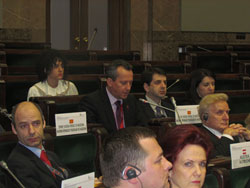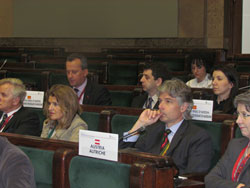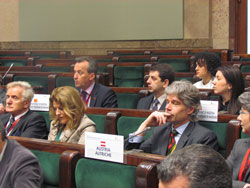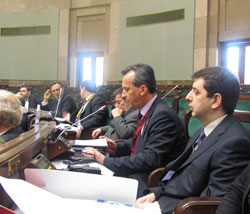Saturday, 22 April 2012, Warsaw
ADDRESS of the president veljanoski on THE PARLIAMENT, PUBLIC OPINION AND THE MEDIA


Distinguished Chairman,
Ladies and gentlemen,
The time we live in requires from us, as politicians and as citizens to realistically perceive, but also to accept that we are functioning in a world in which the Internet, social networks, open debate forums are creating a completely new approach to the media, where the politicians, the general media and journalists are not any more the single ones creating the public opinion. The digital technology provides even more influence to the citizens in shaping and directing the public opinion. The progress of the technology, itself provides the key role in modification of the information and creating new rules for the functioning of the media.
 In this context, the significant issue is the ratio, the existence and the mutual benefit, as well as the danger of such a creative position of the citizen in the media. On one hand, for every issue, it is necessary to hear the opinion of the citizens, but on the other there must be a precaution in the approach towards the subjectivity and irrationality in providing ones’ opinion; the influence of the mentality, the cultural and customary habits, the level of education, tendency to prejudice... All this, positioned against the inclusion of the journalists in the media, aided by the appropriate education and obligation for professional approach in finding, processing and presentation of information.
In this context, the significant issue is the ratio, the existence and the mutual benefit, as well as the danger of such a creative position of the citizen in the media. On one hand, for every issue, it is necessary to hear the opinion of the citizens, but on the other there must be a precaution in the approach towards the subjectivity and irrationality in providing ones’ opinion; the influence of the mentality, the cultural and customary habits, the level of education, tendency to prejudice... All this, positioned against the inclusion of the journalists in the media, aided by the appropriate education and obligation for professional approach in finding, processing and presentation of information.
A wide debate on decriminalization of slander is being led in the Republic of Macedonia. This debate includes the journalist and the media associations, executive governance, NGO sector, domestic and foreign experts, thus creating conditions for freedom and independence of the journalist and the media as well.
Speaking of the position and the role of the parliament in this new and digital media, I have to underline that the Assembly of the Republic of Macedonia has done many qualitative steps forward. The introduction of the E-Parliament provided an overall transparency of the whole legislative process.  The redesigned parliamentary website provides the citizens to contact their MPs or political groups and submit proposals, ideas and remarks. The Parliamentary TV Channel broadcasts all parliamentary sessions, scrutiny debates and meetings of the Assembly’s bodies and tends to start a new, interactive program which will include not only the MPs but all social entities, including the citizens.
The redesigned parliamentary website provides the citizens to contact their MPs or political groups and submit proposals, ideas and remarks. The Parliamentary TV Channel broadcasts all parliamentary sessions, scrutiny debates and meetings of the Assembly’s bodies and tends to start a new, interactive program which will include not only the MPs but all social entities, including the citizens.
Appropriate balance between the presence and the activities of all participants in the media would be an ideal solution, but this state is not easily reachable, considering the multi-directional information process. The question is how to be open and transparent, instead of bias, incomplete or selective!
We must constantly seek for new and more efficient solutions which will decrease the influence of speculation and fabrication in the battle of truth and falsehood, in order to achieve the desired balance of the media.
Thank you.